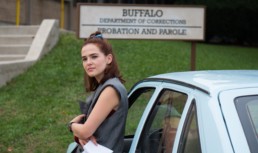'Saint Frances' Review: A Realistic Look at Female Empowerment
In the first quarter of the 2020 film season, there have already been a handful of films that have commented on the complicated topic of abortion and the residual emotional turmoil that follows.
Premature, Never Rarely Sometimes Always, and Saint Frances are, individually, compelling stories about three women's particular journeys. But together, they act as a socio and political cinematic revolution. The taboo surrounding abortion is becoming lessened, and films like these are opening up the conversation for women to feel safe and, more importantly, seen. Screenwriter and actor Kelly O'Sullivan vulnerably shares her experience and life story in the indie darling Saint Frances, in theaters today.
O'Sullivan plays Bridget, a 34-year-old woman who finds herself stuck. Her current relationship with a younger man (who is emotionally mature) provides some sense of security, but her new job as a nanny proves more difficult than expected. Bridget doesn't have the maternal gene, and acting as a guardian to the outspoken and mischievous six-year-old Frances (Ramona Edith-Williams) is challenging. Her frustration and desperation reach their peak when Bridget finds out that she's pregnant, and decides that an abortion is the right decision for her. As we all know, "right" doesn't necessarily mean "easy," and as Bridget struggles to make sense of her situation, she finds compassion, acceptance, and love through her growing friendship with Ramona.
Director Alex Thompson and Kelly O'Sullivan have collaborated seamlessly to create a powerful portrait of a young woman's struggle without making her the victim of her own life. We empathize with Bridget's situation and are amazed by her strength and conviction to keep going. Replaying her past onscreen must've been a delicate and cathartic journey, and O'Sullivan nails the part of Bridget perfectly. Not to be overlooked is firecracker Ramona Edith-Williams, whose performance can only be described as a revolution.
Saint Frances is an excellent reminder that everyone's path is different. Societal expectations shouldn't define your own life choices. Bridget made a decision that was right for Bridget, and we should all remember that when it comes to our own lives.
In 'Burden', Inspired by True Events, a Klansman Seeks Redemption
Burden debuted on the big screen two years ago at the 2018 Sundance Film Festival and despite being officially released in a new decade, its message is still as timely as ever.
Oscar-nominated filmmaker Robbie Brenner (Dallas Buyers Club) and writer/director Andrew Heckler's Southern drama tells the incredible true story of an ex-Klansman who, with the influence of his girlfriend and the town's local reverend, is forced to overcome his own racism and face his disgraceful past. It can be argued that everyone deserves a second chance, including those who we may not think deserve it, and Burden is a testament to the belief that people can change when surrounded by unconditional love.
It's 1996 and a motley crew of people are preparing to open a new tourist attraction in their rural South Carolina town; curated and operated by Tom Griffin (Tom Wilkinson), the revealing of this "Redneck KKK Museum" hits like a punch to the gut. Racism still operates throughout the bigoted town, with Mike Burden (Garrett Hedlund) at the forefront of the organization's next-generation leaders. The brotherhood of the KKK had been his whole life, so the last thing he expected was to fall in love with Judy (Andrea Riseborough), a young mother, who would force him to choose between his relationship with the Klan or her heart.
As Mike struggles with this decision internally, on the surface he is still very combative. His behavior catches the attention of Reverend Kennedy (Forest Whitaker), who sees Mike as a lost boy and is determined to help him work through his destructive past. Reverend Kennedy reminds his skeptical congregation that only love can drive out hate, a nice message in theory, but difficult to put into practice when the person you are asked to unconditionally love has threatened to kill your community. Reverend Kennedy's words ruminate within Mike, who slowly begins to let his guard down in order to let the light, and love, in.
A hard-hitting companion piece to another recent Neo-Nazi true-life adaptation, Skin, Burden is a fascinating retelling of Michael Burden's life. Fueled by a powerhouse performance from Garrett Hedlund, he seamlessly embodies the quirky mannerisms and Southern drawl of the real Mr. Burden. He's a character whose philosophy we can't understand yet still sympathize with his struggle to leave the familiar for the unknown. Andrea Riseborough brings compassion to her confident portrayal of Judy, a strong woman whose sense of justice and self-respect ultimately saved Mike Burden's life. Unsurprisingly, Forest Whitaker commands every scene; his delivery of Reverend Kennedy's words of optimism is both inspiring and soul-shaking. Usher also makes an appearance as Mike's childhood best friend, a fun addition to a solid cast. Usher also makes an appearance as Mike's childhood best friend, a fun addition to a solid cast.
Ultimately, the story of Burden is one of redemption, of forgiveness, and the power of unconditional love.
BURDEN (2020)
Starring Garrett Hedlund, Forest Whitaker, Tom Wilkinson, Andrea Riseborough
Directed by Andrew Heckler
Written by Andrew Heckler
Distributed by 101 Studios. 129 minutes. Opening this Friday in select theaters, including ArcLight Hollywood and AMC Century City.
'Premature' Shows Young Love at the Peak and Demise of a Relationship
A two-time winner at this year's Film Independent Spirit Awards (Someone the Watch Award, John Cassavetes Award), Premature is a poignant portrayal of young love at the peak and demise of a relationship.
Directed by Rashaad Ernesto Green, Premature will transport you back to the very moment you felt sparks fly between a loved one, igniting both the butterflies in your stomach when the times were good and the pit in the same spot when things went south. The beauty of this film, in particular, is the delicate way in which these emotions are felt, worked through, and expressed through art and poetry.
Co-writer and lead Zora Howard plays Ayanna, a teenager enjoying her last summer in New York City with friends before attending out of state school in the fall. Unexpectedly, she meets and falls for Isaiah (Joshua Boone), whose persistence to date her eventually pays off. The duo quickly becomes inseparable, growing and learning from each other as they come of age together, even if only just for a few weeks. A fear of commitment followed by an unexpected pregnancy tarnishes their relationship that began as simple and pure, forcing Zora to make grown-up decisions despite being just a kid herself. To cope, she pours her emotions into a journal, which becomes full of beautiful and heartbreaking poems about the girl she used to know.
Rashaad Ernesto Green captures the fleeting moments of young love so beautifully; the first date that lasts for hours and the many firsts of getting to know someone among them. The fragile piano score adds to the film's delicacy and somberness, a beautiful accompaniment to a layered story. Adding another powerful moment to Premature's entity is one of the closing songs, performed live, with the sharply-felt lyrics “We were too young to live this old.” A perfectly put sentiment, and an early contender for one of the best original songs of 2020.
Sure there are plenty of films about self-discovery and teenage love, but Premature is different. It doesn't shy away from the authentic, real-life problems that can't be fixed with an "I'm Sorry" sign or begging for forgiveness. It's a thoughtful work that cuts right to the heart.
PREMATURE (2020)
Starring Zora Howard, Joshua Boone, Michelle Wilson
Directed by Rashaad Ernesto Green
Written by Rashaad Ernesto Green, Zora Howard
Distributed by IFC Films. 90 minutes. Now playing at select Laemmle theaters and On Demand.
Slick Woods – Rihanna's Muse and Supermodel – Shines in 'Goldie'
Fenty model and Rihanna muse, Slick Woods, makes her acting debut in the low budget, highly eccentric art house film, Goldie.
From 20th Century Studios and Vice Films, Goldie tells the story of a financially struggling and unsupervised teenager whose aspirations of becoming a model/dancer are thwarted after her mother gets arrested and she is left to support her two young sisters. A gritty coming-of-age film that also includes vibrant crayon mixed media animation, director Sam de Jong creates a unique slice of life film whose artistry bursts at the seams.
Goldie (Woods) is 18-years-old and recently unemployed when her drug-dealing mother is unexpectedly locked up. With the threat of Child Protective Services looming, Goldie temporarily puts her dreams of landing a role in an upcoming music video for local legend Tiny (A$AP Ferg) to the side as she steps into the role of guardian for her two younger sisters. Desperate for financial stability - yet falling in love with a beautiful fur coat she feels will change her life - Goldie resorts to a 'Do what it takes to survive' mentality and enlists the help of her friend (George Sample III) to help her push drugs for a quick payday. As luck would have it, the music video opportunity also comes back around, which forces Goldie to question if her idea of fame is worth risking her ability to support her family.
Sam de Jong seems to take visual inspiration from the Safdie brothers, capturing Goldie's Bronx neighborhood with an unrelenting grit and colorful charm. Adding to the film's DIY aesthetic is the cast, which is a mixture of professional and non-professional actors. The lines of reality vs fiction feel blurred, but intentionally so. Sam De Jong uses Slick's amateur actor status to his advantage; the camera lingers on her in scenes with few cutaways, which authentically highlights her emotional reaction. It's a directorial choice that could've felt forced, but in this case, it feels organic and right. Goldie is a bold expression of creativity both in front of and behind the scenes; supporting a film like this is paramount to showing the industry that art films matter.
Starring Slick Woods, George Sample III, Danny Hoch, A$AP Ferg
Directed by Sam de Jong
Written by Sam de Jong
Distributed by Film Movement. 88 minutes. Opening this Friday at Laemmle Glendale and On Demand.
Zoey Deutch is a Teenage 'Jordan Belfort' in Satirical Comedy 'Buffaloed'
Zoey Deutch is the teenage "Jordan Belfort of Buffalo, NY" in the new comedy Buffaloed from director Tanya Wexler.
A fresh and energetic watch from start to finish, Buffaloed can best be described as a hybrid between The Big Short meets The Wolf of Wall Street with the added charisma and charm of Booksmart. And to keep the movie references going, this film could have very easily been named Hustlers, as that's exactly what's at the crux of our protagonist's pursuit for financial freedom and the very questionable way she sets out to achieve her dreams.
Peg Dahl (Deutch) lives at home with her mother and brother, who are both supportive yet skeptical of her wild ambition to leave her hometown in search of bigger and better things. Since she was young, Peg has always excelled at creating financial opportunities, despite her family's lower-class status. With sights set on attending an Ivy League school followed by a job on Wall Street, escaping Buffalo - the debt capital of America - proves more difficult than originally planned. Tuition costs are too much, and Peg begins to see her life dreams dying in front of her. Down on her luck, a chance phone call results in an idea; using her street smarts, quick wit, and financial chops, Peg takes the business of delinquent debt collecting into her own hands.
Buffaloed is a satirical money movie that should be on your radar for many reasons, including the premise that a young female entrepreneur uses her brain, rather than her body, to get ahead. It's a refreshing comedy that relies on the stellar performance from Zoey Deutch to convey the film's tonality. Deutch isn't afraid to play "The Man's Game," and her attitude is admirable. With Buffaloed hitting theaters on February 14th, it makes for the perfect Valentine's night out.
BUFFALOED (2020)
Starring Zoey Deutch, Judy Greer, Jermaine Fowler, Noah Reid, Jai Courtney
Directed by Tanya Wexler
Written by Brian Sacca
Distributed by Magnolia Pictures. 95 minutes. Opening this Friday.
Film Independent Spirit Awards 2020
The morning before Oscar Sunday, the Film Independent Spirit Awards celebrate the best of films that are independently produced and made outside of the typical "Hollywood" studio system.
Many films honored this year were largely ignored by the Academy - including The Farewell, Uncut Gems, Booksmart, and Honey Boy to name a few – but that made their presence here all the more special. Despite their countries of origin, budgets, and talent attached, all of the films recognized at the Spirit Awards have one thing in common: they all embody diversity, innovation, and uniqueness of vision.
Composer Alex Weston Talks Electro-Surrealness in 'Wander Darkly' [WATCH]
Composer Alex Weston, who's perhaps best known for scoring the 2019 breakout 'The Farewell,' chats with Morgan Rojas before the world premiere of Tara Miele's Wander Darkly.
Starring Sienna Miller and Diego Luna, Wander Darkly tells the story of new parents Adrienne and Matteo who are forced to reckon with trauma amidst their troubled relationship. They must revisit the memories of their past and unravel haunting truths in order to face their uncertain future.
In our exclusive interview, Alex Weston talks about creating the sounds and his inspiration for this pseudo-surreal drama.
Composer Tamar-kali on the Supernatural Sounds of 'Shirley' [WATCH]
Composer Tamar-kali chats with Morgan Rojas after the world premiere of Josephine Decker's Shirley at the 2020 Sundance Film Festival.
Starring Elisabeth Moss and Michael Stuhlbarg, Shirley tells the story of a famous horror writer who finds inspiration for her next book after she and her husband take in a young couple. In our exclusive interview, Tamar-kali talks about creating the dynamic and layered sounds that make up the hauntingly magical realism of Shirley.








